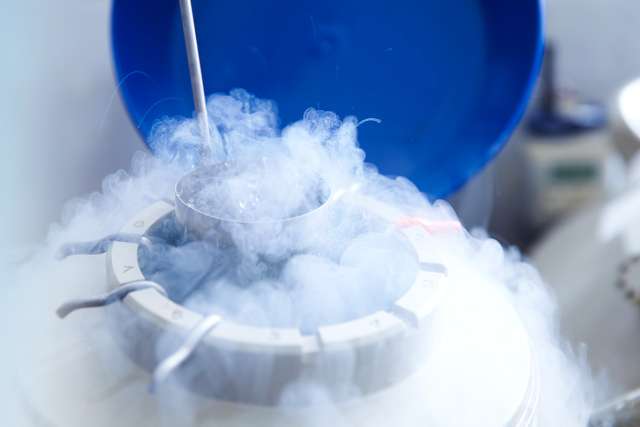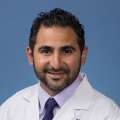Fertility & Reproductive Health
Our reproductive endocrinologists are experts in infertility treatments and use a collaborative, personalized approach to care.

Why choose UCLA Health for fertility and reproductive health?
At the UCLA Fertility and Reproductive Health Center, we provide comprehensive fertility services. We use a collaborative approach based on each person’s needs and preferences. Highlights of our program include:
Expert physicians: All our physicians in the Fertility and Reproductive Health Center are reproductive endocrinologists, meaning they specialize in fertility and reproductive health. The center has also achieved recognition by Newsweek ranking highly in their annual America's Best Fertility Clinics survey.
Improvements in care: While caring for patients, our dedicated specialists also conduct research. We seek to improve fertility and reproductive health care and learn more about disorders that lead to infertility.
Personalized treatment plans: Whether you’re interested in infertility testing, genetic counseling or fertility preservation options, our team can help. We offer a range of services to provide each patient with a personalized care plan that meets their needs and goals.
Our areas of care
The specialists in the Fertility and Reproductive Health Center offer a range of care options, including:
Fertility evaluations: Our reproductive endocrinologists offer comprehensive fertility testing. When we know the root cause of fertility challenges, we can better identify what treatments will work best for you.
Fertility treatments: If you need help getting pregnant, our specialists provide a full range of treatment options such as intrauterine insemination (IUI), in vitro fertilization (IVF) or intracytoplasmic sperm injection (ICSI).
Fertility preservation: If you want to postpone pregnancy, our team offers egg, sperm and embryo freezing. This allows you to have biological children down the road, if desired.
Genetic counseling: If you, your partner or donor has or is a carrier for a known genetic condition, we can help you understand the risks of passing the condition to your baby. We use techniques including preimplantation genetic diagnosis for monogenetic/single gene defects (PGT-M) to ensure that you don’t pass on a hereditary condition to your baby.
LGBTQ+ family planning: Same-sex couples may desire fertility treatments. Options including donor sperm, intrauterine insemination (IUI) and in vitro fertilization (IVF) can give LGBTQ+ couples more options for starting a family.
Male Fertility: For a male fertility evaluation and for more information about male fertility barriers, please visit the Men's Clinic at UCLA.
Oncofertility: Sometimes, cancer treatments such as chemotherapy or radiation can affect a person’s fertility. We work closely with oncologists to offer fertility preservation or treatment options to help you build the family you desire after cancer treatment.
Reproductive surgery: Conditions including endometriosis, fibroids, endometrial polyps and uterine abnormalities may affect fertility. We offer diagnostic testing, management and surgery options to treat underlying conditions and help people succeed in getting pregnant.
Conditions we treat
Many conditions can affect your fertility. We diagnose and treat all types of these conditions with skill and compassion, including:
Dysfunctional uterine bleeding (irregular periods): When a person menstruates with irregularity, either in terms of frequency or duration
Endometriosis: When the tissue that lines the inside of your uterus grows outside the uterus, often into the fallopian tubes
Infertility: An inability to achieve pregnancy even after having consistent, unprotected sex for six months to a year
Müllerian anomalies of the uterus: When parts of the reproductive system, including the uterus and cervix, develop irregularly or are missing entirely
Polycystic ovary syndrome (PCOS): A hormonal disorder that involves infrequent menstrual periods, excess sex hormone (androgen) levels and numerous cysts (follicles) in the ovary that fail to regularly release eggs
Premature ovarian failure: When your ovaries stop producing eggs before age 40
Recurrent pregnancy loss: When a person has two or more failed pregnancies
Uterine fibroids: Benign, or noncancerous, growths that appear in the uterus
Treatments we offer
Our specialists work with you to find the best treatment option for your individual needs. Infertility treatments we offer include:
Controlled ovarian stimulation: You take oral or injectable (with a needle) medications that cause one or more eggs to release from the ovary.
Donor oocytes: A fertile person may donate immature egg cells (oocytes) to be fertilized with sperm in a dish. We then transfer the fertilized egg into the recipient's uterus.
Egg cryopreservation (freezing): A technique used to harvest (gather) and store eggs to postpone pregnancy until a later date.
Embryo cryopreservation: Preserving and freezing embryos to use at a later date.
Gestational carrier care: A gestational carrier is a person who agrees to carry and give birth to a baby genetically related to the intended parents and unrelated to the carrier. This allows an individual who is unable to carry a pregnancy to have a biological child.
Intrauterine insemination (IUI): Washing a partner’s sperm or a donor sperm, then placing it into the uterus.
In vitro fertilization (IVF): Mixing eggs and sperm in a laboratory setting to create an embryo to be placed back in the uterus immediately or at a later date.
Intracytoplasmic sperm injection (ICSI): An option during IVF where specialists inject one sperm directly into the egg.
Preimplantation genetic testing for aneuploidy screening (PGT-A): A genetic screening option that you can choose to perform on an embryo. This tests for chromosomal (genetic) abnormalities before implantation.
Preimplantation genetic diagnosis for monogenetic/single gene defects (PGT-M): Genetic testing that can be performed on an embryo prior to implantation if you, your partner or donor is a carrier for a known genetic condition.
Meet our team
Our reproductive endocrinologists specialize in infertility diagnosis and treatment. We also conduct research and clinical trials so that we can better understand fertility causes and offer treatments that work.
Faculty & Attendings - Westwood & Santa Monica
Contact us
Call to request an appointment with a fertility specialist at UCLA Health.
Find your care
For help starting a family, our fertility specialists provide a full range of infertility treatments. To connect with a customer care specialist, call .




